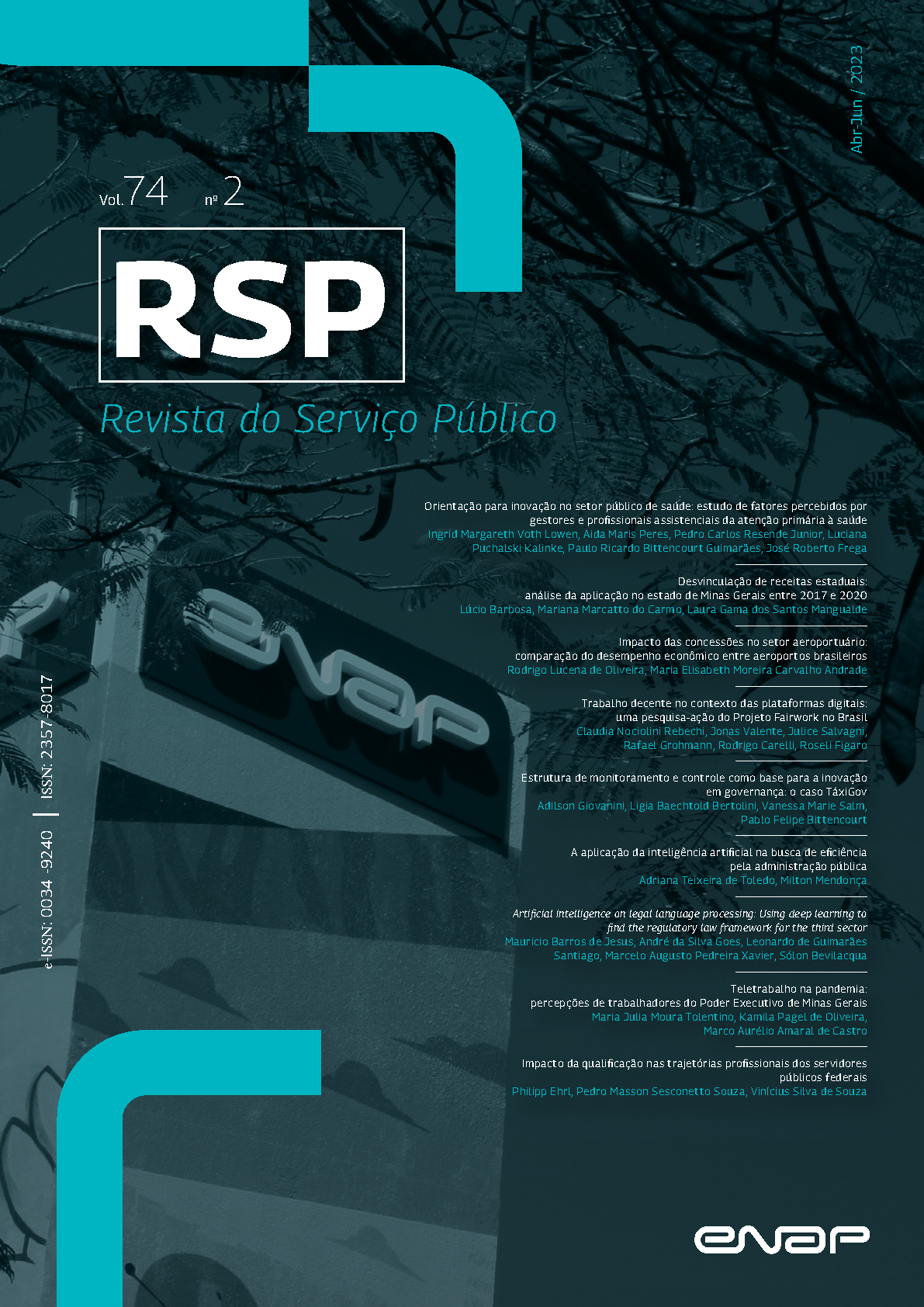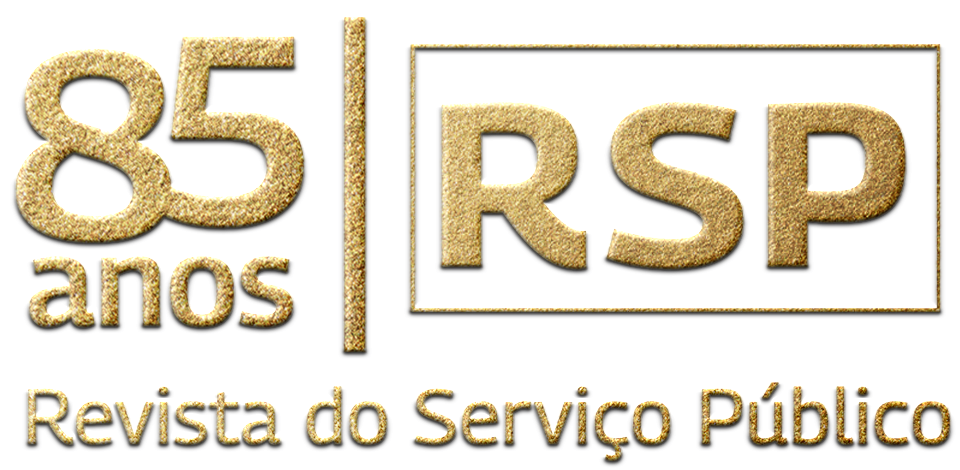Monitoring and control structure as a basis for innovation in governance: the TaxiGov case
Keywords:
public sector, design principles, on-demand transport platforms, monitoring and control structuresAbstract
The study analyzes how TaxiGov's Monitoring and Control Structure (EMC) is organized. The design principles proposed by Ostrom (1990) are revisited based on new evidence provided by the literature on digital platforms, through the application of a questionnaire and documentary research. The results show that four of the eight design principles are applied, with EMC being decentralized to local public bodies, which gives autonomy to local managers who complement and customize the rules. Thus, the main advance of the article is to demonstrate that the design principles, identified by the social goods literature, added to the flexibility of digital platforms, enable the construction of more dynamic, adaptable, and innovative EMCs, capable of contributing to the construction of regimes of the more appropriate use of public services. Result adherent to the contingent and dynamic character associated with the classification of goods.
Downloads
References
ABREU JÚNIOR, Fernando Souza. Economia compartilhada: implementação do TáxiGov na Universidade de Brasília. Dissertação (Mestrado em Gestão Pública) –Universidade de Brasília, 2020.
AXELROD, Robert; DION, Douglas. The further evolution of cooperation. Science, v.242, n.4884, p.1385-1390, 1988.
BALLIET, Daniel. Communication and cooperation in social dilemmas: A meta-analytic review. Journal of Conflict Resolution, v.54, n.1, p.39-57, 2010.
BRADLEY, Karin; PARGMAN, Daniel. The sharing economy as the commons of the 21st century. Cambridge Journal of Regions, Economy and Society, v.10, n.2, p.231-247, 2017.
BRASIL. Constituição da República Federativa do Brasil de 1988. Saraiva, São Paulo, 1988.
BRASIL. Lei nº 8.112, de 11 de dezembro de 1990. Brasília, Distrito Federal, Brasília, DF: Diário Oficial da União, 1990.
BRASIL. Lei nº 10.520, de 17 de julho de 2002. Brasília, Distrito Federal, Diário Oficial da União, 2002.
BRASIL. TáxiGov: mobilidade de servidores no governo federal. Escola Nacional de Administração Pública, 2019a.
BRASIL. TÁXIGOV 2.0. Ministério do Planejamento, Desenvolvimento e Gestão. Brasília, 2019b.
BRASIL. O que é o TáxiGov. Ministério da Economia, disponível em: https://www.gov.br/economia/pt-br/assuntos/gestao/central-de-compras/TáxiGov, acesso em: 16, 2021.
BUCHANAN, James McGill. An economic theory of clubs. Economica, n.29, 1965.
CANNON, Bryant; CHUNG, Hanna. A framework for designing co-regulation models well-adapted to technology-facilitated sharing economies. Santa Clara Computer & High Tech, v.31, p.23, 2014.
COHEN, Molly; SUNDARARAJAN, Arun. Self-regulation and innovation in the peer-to-peer sharing economy. U. Chi. L. Rev. Dialogue, v.82, 2015.
COWEN, Tyler. Public goods definitions and their institutional context: a critique of public goods theory. Review of Social Economy, v.43, n.1, p.53-63, 1985.
GIOVANINI, Adilson. Economia compartilhada e governança pública. Revista de Administração Pública, v.54, n.5, p.1207-1238, 2020.
HESS, Charlotte; OSTROM, Elinor. Understanding knowledge as a commons: from theory to practice. MIT press, Cambridge, 2007.
JACOBIDES, Michael G.; DREXLER, Michael; RICO, Jason. Rethinking the future of financial services: A structural and evolutionary perspective on regulation. Journal of Financial Perspectives, v.2, n.1, 2014.
KOLLOCK, Peter. Social dilemmas: The anatomy of cooperation. Annual review of sociology, v.24, n.1, p.183-214, 1998.
KORNBERGER, Martin; PFLUEGER, Dane; MOURITSEN, Jan. Evaluative infrastructures: Accounting for platform organization. Accounting, organizations and society, v.60, p.79-95, 2017.
LEONI, Giulia; PARKER, Lee D. Governance and control of sharing economy platforms: Hosting on Airbnb. The British Accounting Review, v.51, n.6, 2019.
MARCOLINO, Daniel Mol; REZENDE, Juliano Flávio dos Reis; MONTEIRO, Luis Felipe Salin; LOPES, Virgínia Bracarense; AGUIAR, Wolmar Vieira de. TáxiGov: inovação no serviço de mobilidade de servidores como modelo de centro de serviços compartilhados no governo federal. In: X Congresso Consad de Gestão Pública, 2017.
MESSICK, David M.; BREWER, Marilynn B. Solving social dilemmas: A review. In: BAZERMAN, Max H. (Ed.). Negotiation, decision making and conflict management, v.1–3, p. 98–131, Edward Elgar Publishing, 2005.
MUSGRAVE, Richard A. The theory of public finance; a study in public economy. Kogakusha, 1959.
OLSON, Mancur. The logic of collective action, cambridge, mass. Harvard Univ. Press, 1965.
OSTROM, Elinor. Governing the commons: The evolution of institutions for collective action. Cambridge university press, 1990.
OSTROM, Elinor; GARDNER, Roy; WALKER, James. Rules, games, and common-pool resources. University of Michigan press, 1994.
OSTROM, Vincent; OSTROM, Elinor. Public Goods and Public. The University of Michigan Press, 1999.
OSTROM, Elinor. Design principles of robust property-rights institutions: what have we learned. Elinor Ostrom and the Bloomington School of Political Economy. Resource Governance, p.215-248, 2008.
PARKER, Geoffrey G.; VAN ALSTYNE, Marshall W.; CHOUDARY, Sangeet Paul. Plataforma: a revolução da estratégia. Alta Books, 2019.
PLANTIN, Jean-Christophe; PUNATHAMBEKAR, Aswin. Digital media infrastructures: pipes, platforms, and politics. Media, Culture & Society, v.41, n.2, p.163-174, 2019.
RAYAMAJHEE, Veeshan. On the Dynamic Nature of Goods: applications in post-disaster contexts. In: BOETTKE, Peter J.; HERZBERG, Bobbi; KOGELMANN, Brian (Ed.). Exploring the Political Economy and Social Philosophy of Vincent and Elinor Ostrom, p. 145-181, 2020.
RAYAMAJHEE, Veeshan; PANIAGUA, Pablo. The Ostroms and the contestable nature of goods: beyond taxonomies and toward institutional polycentricity. Journal of Institutional Economics, v.17, n.1, p.71-89, 2021.
SAMUELSON, Paul A. The pure theory of public expenditure. The review of economics and statistics, p.387-389, 1954.
SCOTT, Susan V.; ORLIKOWSKI, Wanda J. Reconfiguring relations of accountability: Materialization of social media in the travel sector. Accounting, organizations and society, v.37, n.1, p.26-40, 2012.
ŠESTÁKOVÁ, Anna; PLICHTOVÁ, Jana. Contemporary commons: Sharing and managing common-pool resources in the 21st century. Human Affairs, v.29, n.1, p.74-86, 2019.
THIERER, Adam; KOOPMAN, Christopher; HOBSON, Anne; KUIPER, Chris. How the internet, the sharing economy, and reputational feedback mechanisms solve the lemons problem. U. Miami L. Rev., v.70, 2015.
TIWANA, Amrit; KONSYNSKI, Benn; BUSH, Ashley A. Research commentary-Platform evolution: Coevolution of platform architecture, governance, and environmental dynamics. Information systems research, v.21, n.4, p.675-687, 2010.
TIWANA, Amrit; KONSYNSKI, Benn; VENKATRAMAN, N. Information technology and organizational governance: The IT governance cube. Journal of Management Information Systems, v.30, n.3, p.7-12, 2013.
WIRTZ, Jochen et al. Platforms in the peer-to-peer sharing economy. Journal of Service Management, v. 30, n. 4, p. 452-483, 2019.
Downloads
Published
How to Cite
Issue
Section
License
Copyright (c) 2023 Revista do Serviço Público

This work is licensed under a Creative Commons Attribution-NonCommercial-ShareAlike 4.0 International License.
- A RSP adota a licença Creative Commons (CC) do tipo Atribuição – Uso Não-Comercial (BY-NC).
- A licença permite que outros remixem, adaptem e criem obra licenciada, sendo proibido o uso com fins comerciais.
- As novas obras devem fazer referência ao autor nos créditos e não podem ser usadas com fins comerciais, porém não precisam ser licenciadas sob os mesmos termos dessa licença.
- Ao publicar o artigo na RSP, o autor cede e transfere para a ENAP os direitos autorais patrimoniais referentes ao artigo.
- O artigo publicado na RSP não poderá ser divulgado em outro meio sem a devida referência à publicação de origem.
- O autor que tiver o artigo publicado na RSP deverá assinar o Termo de Concessão de Direitos Autorais (em momento oportuno a editoria da Revista entrará em contato com o autor para assinatura do Termo).



